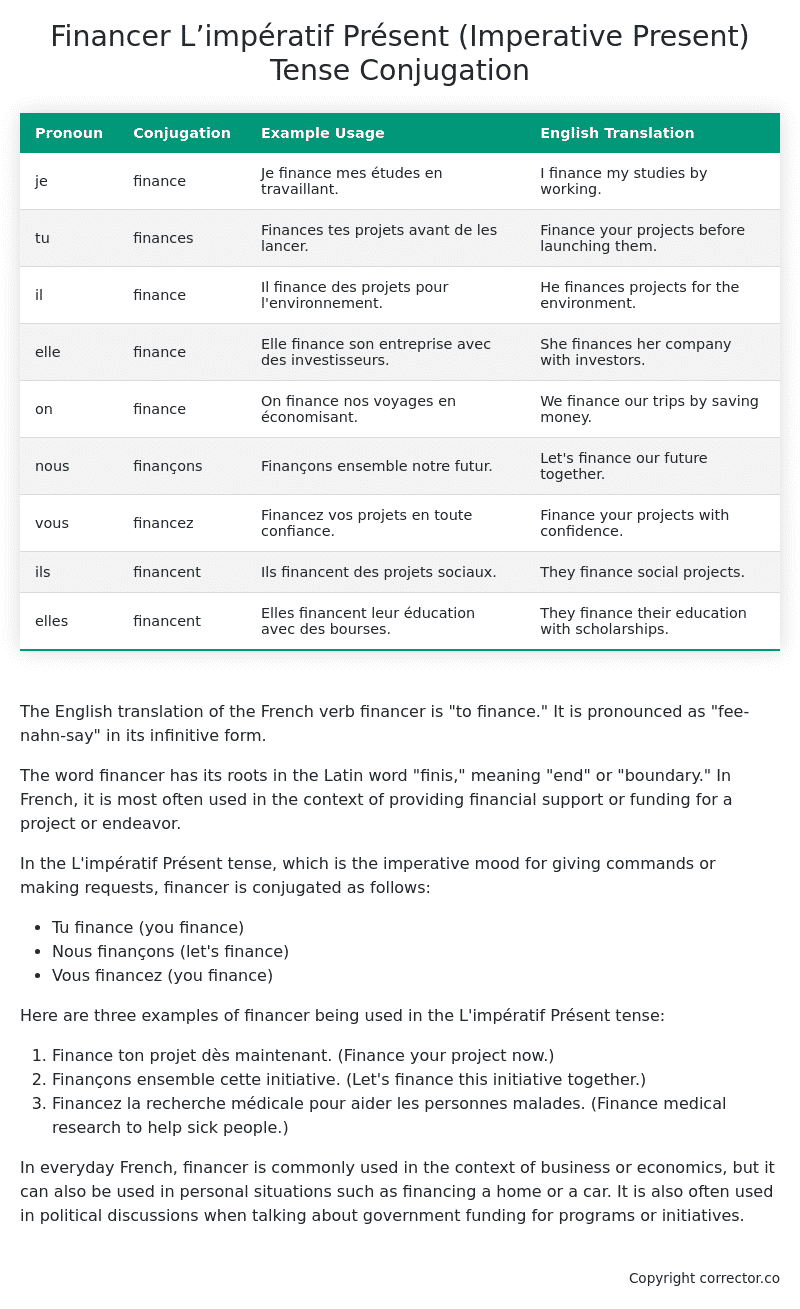L’impératif Présent (Imperative Present) Tense Conjugation of the French Verb financer
Introduction to the verb financer
The English translation of the French verb financer is “to finance.” It is pronounced as “fee-nahn-say” in its infinitive form.
The word financer has its roots in the Latin word “finis,” meaning “end” or “boundary.” In French, it is most often used in the context of providing financial support or funding for a project or endeavor.
In the L’impératif Présent tense, which is the imperative mood for giving commands or making requests, financer is conjugated as follows:
- Tu finance (you finance)
- Nous finançons (let’s finance)
- Vous financez (you finance)
Here are three examples of financer being used in the L’impératif Présent tense:
- Finance ton projet dès maintenant. (Finance your project now.)
- Finançons ensemble cette initiative. (Let’s finance this initiative together.)
- Financez la recherche médicale pour aider les personnes malades. (Finance medical research to help sick people.)
In everyday French, financer is commonly used in the context of business or economics, but it can also be used in personal situations such as financing a home or a car. It is also often used in political discussions when talking about government funding for programs or initiatives.
Table of the L’impératif Présent (Imperative Present) Tense Conjugation of financer
| Pronoun | Conjugation | Example Usage | English Translation |
|---|---|---|---|
| je | finance | Je finance mes études en travaillant. | I finance my studies by working. |
| tu | finances | Finances tes projets avant de les lancer. | Finance your projects before launching them. |
| il | finance | Il finance des projets pour l’environnement. | He finances projects for the environment. |
| elle | finance | Elle finance son entreprise avec des investisseurs. | She finances her company with investors. |
| on | finance | On finance nos voyages en économisant. | We finance our trips by saving money. |
| nous | finançons | Finançons ensemble notre futur. | Let’s finance our future together. |
| vous | financez | Financez vos projets en toute confiance. | Finance your projects with confidence. |
| ils | financent | Ils financent des projets sociaux. | They finance social projects. |
| elles | financent | Elles financent leur éducation avec des bourses. | They finance their education with scholarships. |
Other Conjugations for Financer.
Le Present (Present Tense) Conjugation of the French Verb financer
Imparfait (Imperfect) Tense Conjugation of the French Verb financer
Passé Simple (Simple Past) Tense Conjugation of the French Verb financer
Passé Composé (Present Perfect) Tense Conjugation of the French Verb financer
Futur Simple (Simple Future) Tense Conjugation of the French Verb financer
Futur Proche (Near Future) Tense Conjugation of the French Verb financer
Plus-que-parfait (Pluperfect) Tense Conjugation of the French Verb financer
Passé Antérieur (Past Anterior) Tense Conjugation of the French Verb financer
Futur Antérieur (Future Anterior) Tense Conjugation of the French Verb financer
Subjonctif Présent (Subjunctive Present) Tense Conjugation of the French Verb financer
Subjonctif Passé (Subjunctive Past) Tense Conjugation of the French Verb financer
Subjonctif Imparfait (Subjunctive Imperfect) Tense Conjugation of the French Verb financer
Subjonctif Plus-que-parfait (Subjunctive Pluperfect) Tense Conjugation of the French Verb financer
Conditionnel Présent (Conditional Present) Tense Conjugation of the French Verb financer
Conditionnel Passé (Conditional Past) Tense Conjugation of the French Verb financer
L’impératif Présent (Imperative Present) Tense Conjugation of the French Verb financer (this article)
L’infinitif Présent (Infinitive Present) Tense Conjugation of the French Verb financer
Struggling with French verbs or the language in general? Why not use our free French Grammar Checker – no registration required!
Get a FREE Download Study Sheet of this Conjugation 🔥
Simply right click the image below, click “save image” and get your free reference for the financer L’impératif Présent tense conjugation!

Financer – About the French L’impératif Présent (Imperative Present) Tense
Usage
Giving commands
Making requests
Offering advice
Expressing desires
Conjugation Formation
Interactions with other tenses
Want More?
I hope you enjoyed this article on the verb financer. Still in a learning mood? Check out another TOTALLY random French verb conjugation!


